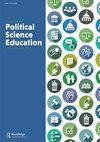今天的孩子:他们在乎,但他们不认为我们在乎
IF 0.6
Q3 POLITICAL SCIENCE
引用次数: 0
摘要
摘要学者和实践者都知道,当学生选择与他们的自我概念相一致的专业时,他们会茁壮成长。较少调查的是他们做出选择所掌握的信息以及他们如何收集这些知识。这项研究表明,学生对政治学及其相关机会的印象与现实之间存在显著差距。具体而言,我们发现,许多学生将政治理解为职业,而将政治学理解为专业,这使他们无法看到学位带来的职业选择范围。这篇文章还表明,正如大多数大学所希望的那样,大学顾问是学生选择专业信息的重要潜在来源,但他们可能不熟悉与特定专业相关的主题和职业。最后,我们表明,有意向顾问、学生和家长告知政治学学位的内容和机会有助于缩小信息差距,我们还指出了如何在其他环境中重复这里描述的实用策略。本文章由计算机程序翻译,如有差异,请以英文原文为准。
Kids Today: They Care, But They Don’t Think We Do
Abstract Scholars and practitioners know that students flourish when they choose majors that are congruent with their self-conceptions. What is less investigated is the information they have for making that choice and how they gather that knowledge. This study demonstrates that a significant gap exists between student impressions of political science and its associated opportunities, on one hand, and reality, on the other. Specifically, we show that many students substitute their understanding of politics-as-career for an understanding of political-science-as-major, which prevents them from seeing the range of career options opened by the degree. The article also shows that university advisors are an important potential source of student information about major choice, as most universities intend, but they may be unfamiliar with the subject matter and careers associated with particular majors. Finally, we show that intentional efforts to inform advisors, students, and parents of the content and opportunities of a Political Science degree can help close the information gap, and we indicate how the practical strategy described here could be repeated in other settings.
求助全文
通过发布文献求助,成功后即可免费获取论文全文。
去求助
来源期刊

Journal of Political Science Education
POLITICAL SCIENCE-
CiteScore
1.80
自引率
36.40%
发文量
69
期刊介绍:
The Journal of Political Science Education is an intellectually rigorous, path-breaking, agenda-setting journal that publishes the highest quality scholarship on teaching and pedagogical issues in political science. The journal aims to represent the full range of questions, issues and approaches regarding political science education, including teaching-related issues, methods and techniques, learning/teaching activities and devices, educational assessment in political science, graduate education, and curriculum development. In particular, the journal''s Editors welcome studies that reflect the scholarship of teaching and learning, or works that would be informative and/or of practical use to the readers of the Journal of Political Science Education , and address topics in an empirical way, making use of the techniques that political scientists use in their own substantive research.
 求助内容:
求助内容: 应助结果提醒方式:
应助结果提醒方式:


